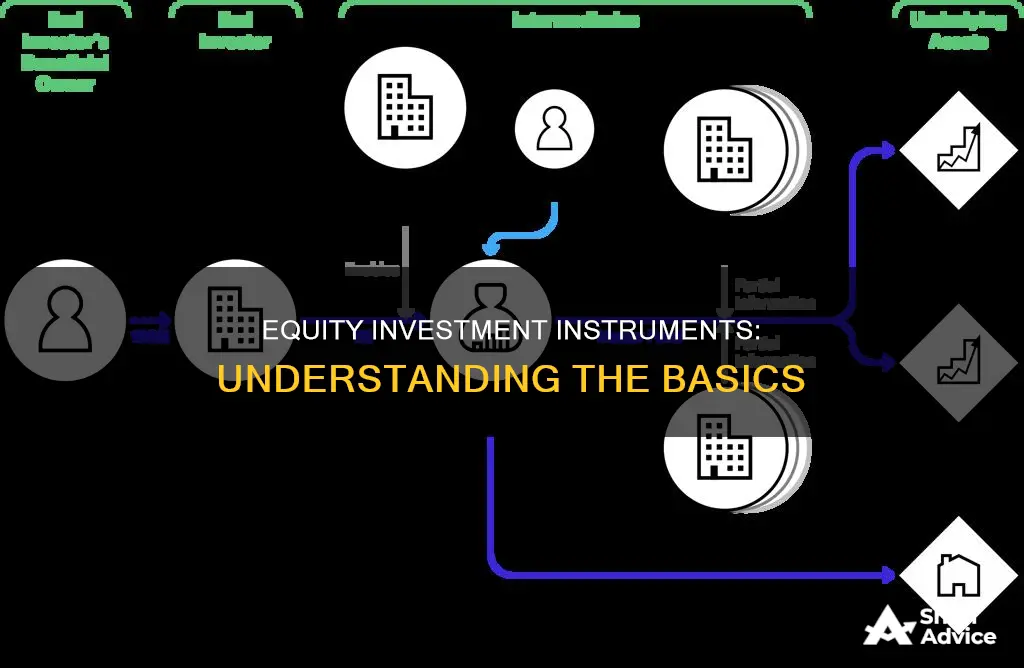
Equity investment instruments are a type of financial instrument that represents ownership of an asset. They are documents that act as legal evidence of proof of ownership rights, such as share certificates, in a company or firm. These instruments are used by businesses that rely on shareholders to fund their operations, providing a way to fund operations and prove ownership. Equity investment instruments include common stock, preferred stock, warrants, convertible debt, equity lines of credit, and restricted shares. Common stockholders typically have voting privileges and receive dividends, while preferred stockholders have priority in capital repayment but no voting rights. Equity investment instruments offer the potential for long-term capital appreciation but carry a higher risk of loss compared to fixed-income investments.
| Characteristics | Values |
|---|---|
| Definition | Financial instruments that represent ownership of an asset |
| Types | Common stock, preferred stock, warrants, convertible debt, equity line of credit, restricted shares, private equity, venture capital, growth capital, mezzanine capital, offshore equity investment |
| Benefits | Potential for higher returns, no interest charged, opportunity for investor to add value with their knowledge and skills |
| Risks | Loss of control for the company, high risk for the investor, no guarantee of dividends |

Common stock
In the event of liquidation, common stockholders are last in line to claim any remaining assets after creditors, bondholders, and preferred stockholders. This means that common stockholders will only receive their share of the assets if there is anything left after all other obligations have been met.
When investing in common stock, it is essential to consider the company's performance, market conditions, and your risk tolerance. Common stock is suitable for investors seeking higher potential returns and who are comfortable with the associated risks.
Investing in New York's 529: A College Savings Guide
You may want to see also

Preferred stock
Equity investment instruments are financial instruments that represent ownership of an asset. They are a type of security that can be traded or exchanged on the stock market. Equity investors purchase shares of a company with the expectation that they will increase in value and/or generate dividends.
There are several types of preferred stock, including prior preferred stock, preference preferred stock, convertible preferred stock, cumulative preferred stock, noncumulative preferred stock, and participating preferred stock. Each type has different features that make them more or less favourable to investors. For example, convertible preferred stock allows shareholders to exchange their preferred stock for common stock shares, while cumulative preferred stock requires that any unpaid dividends are accumulated and paid in the future.
Stockholder Investment: Is It Really Equity?
You may want to see also

Warrants
There are two main types of warrants: call warrants and put warrants. A call warrant is the right to buy shares at a certain price in the future, while a put warrant is the right to sell shares back to the company at a specific price in the future. Warrants can also be classified by their exercise style: American warrants can be exercised anytime before or on the stated expiration date, while European warrants can only be exercised on the expiration date.
The warrant certificate includes important information such as the security's characteristics, the holder's rights and obligations, the expiration date, and detailed information on the underlying instrument. The conversion ratio states the number of warrants necessary to buy or sell one investment unit. For example, a conversion ratio of 3:1 means that three warrants are needed to purchase one share.
However, warrants also have drawbacks and risks. The high leverage they offer can work against an investor if the share price drops. Additionally, the value of the certificate can drop to zero, and warrant holders have no voting, shareholder, or dividend rights.
What's the Deal? Investment Managers and Broker-Dealers Explained
You may want to see also

Convertible debt
Equity investment instruments are financial instruments that represent ownership of an asset. They are typically traded on a stock exchange, and investors purchase shares of a company with the expectation that they will increase in value.
However, one caveat is that if future equity rounds fail to materialize, the debt remains outstanding until maturity, creating a liability for the company. Additionally, interest repayments can hurt cash flow and limit growth, and there may be more equity dilution when the debt is converted to equity.
Shareholders, Investments, and Equity: What's the Real Difference?
You may want to see also

Equity line of credit
An equity line of credit, or HELOC, is a variable-rate home equity product that works like a credit card. It offers a line of credit based on the equity in your home that you can borrow against when you need to.
HELOCs have both a draw period and a repayment period. During the draw period, which usually lasts between five and ten years, you can borrow funds as needed. During this time, you might only be required to pay interest. Once the draw period ends, you will enter the repayment period, which can be as long as 20 years. During this time, you will repay what you borrowed, plus interest.
HELOCs tend to have lower interest rates than credit cards and personal loans. They also have lower upfront costs and closing costs than home equity loans. Additionally, interest is only charged on the amount of money you use.
However, there are some potential downsides to HELOCs. They have variable interest rates, which means your rate can go up or down based on economic conditions and other factors. This could cause your payments to increase dramatically. HELOCs are also secured loans, meaning your house is used as collateral. If you can't make your monthly payments, you risk losing your home.
To qualify for a HELOC, you will typically need a minimum percentage of equity in your home, a low debt-to-income (DTI) ratio, a reliable payment history, and a solid credit score.
FactSet for Portfolio Management: Strategies and Benefits
You may want to see also
Frequently asked questions
Equity investment instruments are financial tools that allow individuals or firms to invest in a company, typically through the purchase of stocks or shares. These instruments provide evidence of ownership rights and are often used by companies to raise capital for their operations or growth plans.
There are several types of equity investment instruments, including common stock, preferred stock, warrants, convertible debt, equity lines of credit, and private equity investments such as venture capital and growth capital. Each type has its own characteristics and offers different levels of risk and potential returns.
Equity investment instruments provide individuals or firms with ownership rights in a company. Investors provide capital to the company, usually in exchange for shares or stock, and they earn profits in the form of capital gains or dividends. The value of the investment is directly linked to the company's performance, and investors may have varying levels of decision-making power based on their class of shares.
Equity investment instruments offer the potential for higher returns compared to other investment options. They provide investors with an opportunity to maximise their wealth by investing in companies with strong growth prospects. However, they also carry a considerable risk factor as the returns are dependent on the company's performance. Equity investments may also result in a loss of management control for the company and increased volatility.







